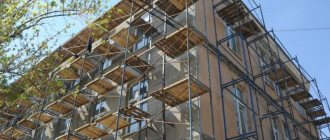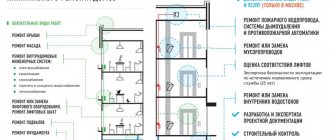Is it a duty?
Are residents required to pay contributions to the fund for major repairs?
Yes, it's a duty. Payment is not imposed only on owners of housing belonging to the emergency fund and certain categories of citizens recognized as socially least protected.
And the notorious Determination No. A-57-APG14-2 dated June 4, 2014, which is referred to , in no way repeals the provisions of the law, it is only an answer to the question of the legality of the regional operator’s fund. And what powers he has.
And the fact that you need to pay for major repairs is stated without any misinterpretation in the federal legislation of the Russian Federation , which has not yet lost its force.
We talk more about payments for major repairs and whether they are voluntary or mandatory in this material.
Payment options
How to charge tenants for water and other services? The tenant must make monthly payments for the rented premises and rent. You can include a fixed fee for utility costs in the rental price, or the amount will change monthly according to accruals.
It should be borne in mind that specifying fixed payment amounts for utility services can lead to the employer becoming uneconomical about resource consumption , which will be unprofitable for the landlord.
The renter may begin to feel that the apartment is costing him more than it should.
If the amount of payment is set on the basis of monthly receipts, then most often this option turns out to be beneficial to both parties - the employer can reduce the amount of payment while using resources economically , and the owner will receive the same amount regardless of the amount of the payment.
With this option, the homeowner should take care of installing meters in advance.
There are several options for receiving apartment rental and utility payments from residents:
- Pick them up in person every month. This method can be conveniently combined with regular inspections of the condition of the home.
- If you rent housing through an intermediary , transfer the payment through him. This option would be optimal if the owner lives in another city or in a rural area.
- Transfer the entire payment amount to a bank card or account of the apartment owner. As in the previous case, it is suitable if the owner does not have the opportunity to meet with the employer every month to receive money.
- The tenant himself transfers funds for housing and communal services using receipts and transfers the checks along with the rent to the owner.
In the first three cases, the owner himself makes payments for utilities using receipts. Read on our website about how to confirm payment for renting accommodation on a business trip.
Who has the right not to pay?
Who is not obliged to pay for major repairs of common property in an apartment building? There are such “castes” (Federal Law No. 399-FZ of December 29, 2015). Contributions for major repairs for homeowners are not mandatory for:
- residents of emergency housing (money will be returned if the “extortions” began after the housing was declared unsuitable or dangerous for habitation!);
- living in housing seized by the state;
- single citizens who have reached the age of 80.
You will find out who else and how can refuse to pay contributions for major repairs from this publication.
Some citizens will be compensated for expenses in the amount of up to 50% : these are disabled people of groups 1 and 2, pensioners over 70 years old (single or living in a family only of people of retirement age), disabled people from childhood and those who have a disabled child. We tell you more about who is entitled to benefits here.
Separately, it is worth mentioning the owners of apartments in new buildings . The law says nothing about them and does not classify them as “legal defaulters”.
Although in their case we will talk about repairs no earlier than in five to ten years. Are homeowners required to pay for major repairs if the building that needed repairs for one reason or another is “younger” than 5 years old? In this case, all work on the restoration of a new apartment building is assigned to the construction company.
It will not be possible not to pay, but there is every reason to hope that their situation will be taken into account by legislators.
The question of who may not pay for major repairs and what is said in judicial practice regarding this, we consider in detail in this article.
In what cases is the payment for major repairs reduced?
It is legally possible not to pay for major repairs if the housing belongs to a certain type of real estate or if the owner himself is the holder of benefits. The following buildings will be exempt from payment:
- emergency apartment buildings, provided that they will be demolished in the near future;
- houses, the land under which is the property of the state and will be used by it to satisfy its goals;
- the house is a new building (in this case a deferment is provided, but not more than 3-5 years);
- the person living in the apartment is not its owner, but is here under a social tenancy agreement;
- the owner of the apartment is a 70-year-old pensioner and lives with the same pensioner (50% discount and full exemption if the pensioner turns 80);
- other beneficiaries, whose benefits are determined at the local level (Chernobyl victims, large families, etc.).
In order not to pay capital repair contributions, you must write an application and collect documents confirming the availability of the benefit and the legal way to use it. This can be done at the MFC or on the State Services portal.
We look at the provisions of the law
Is the payment for major repairs mandatory or voluntary? Just a couple of years ago, these contributions were indeed voluntary.
In 2014 (from July 1), amendments were made to Federal Law No. 271-FZ. In particular, Article 13 was “decorated” with clause 8.2, and it precisely implies minimum contributions for major repairs.
Is the law perfect? At the moment, the ambiguities are really striking , for example, the lack of a boundary between current repairs and major ones.
That is, in practice, of course, everyone understands the difference in terminology - routine repairs are minor corrections, such as painting, plastering, structural repairs. Major works include larger-scale works - improvements to structures, restoration of worn parts, etc.
But the fact of the matter is that the column in payments from housing and communal services is called “current repairs” . But the residents are already paying for it, that’s why they are indignant: why are they obliging them to pay more?!
In fact, one should only be outraged by unclear wording of the law , which cannot always be correctly understood right away. In fact, the money will go to the intended purposes.
The trouble is that the border between current and major repairs is often very arbitrary. What is the difference between contributions for major and current repairs, we explained here.
Another reason for the dissatisfaction of the inhabitants of the houses is the putting of money into what they think is a “common pot”. That is, there are two “piggy banks”:
- special account for a separate building (established in agreement with the meeting of homeowners);
- regional operator account.
It is clear that the last “piggy bank” is more voluminous and contributions from many houses are received there. Is it necessary to pay into the capital repair fund, since many people absolutely rightly do not want to pay for other people’s repairs?
But according to the authorities, there is no need to fear this - strict records of all incoming tranches are kept and not a single house will be repaired at the expense of another.
Where and how you can find out where the money paid for major repairs went and who should provide such information, we tell you here.
The size of the trenches also varies in different regions of Russia . Its size is influenced by many nuances, for example, how old the building is, what material it is built from, whether it has an elevator or not, etc.
How is the benefit assigned?
The general rule is this: compensation for contributions for major repairs to pensioners and other beneficiaries is calculated based on the contribution per one square meter of total housing area per month, and it is determined by the regions.
This benefit is a refund of money paid on monthly receipts. If there are debts, payments are suspended.
If a citizen returns to work, the 50% compensation for capital repairs to pensioners over 70 years of age will no longer be paid. In addition, the benefit stops if a working relative is registered.
This measure of social support is not provided automatically, but upon application from the first day of the month following the month of application.
IMPORTANT!
In addition to the minimum contribution, local authorities also set a standard for the standard area of housing, and if the apartment is large, then even 100 percent compensation for major repairs for pensioners over 80 years of age will not cover the entire payment.
No down payment and no payment after the first down payment: is there a difference?
Contributions are preliminary ; work will be carried out when the required amount has accumulated in the account. The HOA can take this process completely into its own hands and open its own account.
True, there is one “but” - if the deadline approaches, and it turns out that there are no funds, the owners will have to take out a loan from the bank.
Are we obligated to pay for major home repairs if there is no contract? There is also an opinion: if the contract has not been signed and the first payment has not been made (this is the effective confirmation of the party about the existence of a contractual relationship), then there is no need to pay.
In this case, they refer to Article 425 of the Civil Code, which regulates the adoption of the agreement.
I would like it that way, but in reality everything again comes down to the notorious Federal Law No. 271-FZ and Article 169 of the Housing Code.
It is they, and not the contract, who dictate to apartment owners whether to pay or not . The need for payment is clearly stated in the regulations.
After the adoption of the law, eight months are allotted for apartment owners to decide at a general meeting to whom they will transfer the contributions - to the regional operator or to a special account for their building.
Because it is the general meeting of owners that is the governing body of the house (Article 44 of the Housing Code), but it is not the final authority.
If a decision is not made, no problem - a regional account already exists and was kindly provided by the municipality.
Is it necessary to pay for major repairs? As you can see, the question “is it possible not to pay” is not worth it at all - the law obliges us to pay for repairs . The choice is “where to transfer contributions” - and here the owners are given a certain freedom of action.
Legislative regulation of issues regarding major repairs
The funds of the owners of apartments in an apartment building are used to carry out repairs in their own houses. This strategy was undertaken in 2012 . According to the changes, residents of the house pay state and municipal authorities, and they carry out major repairs in the house, which is under their authority.
Regulatory documentation relating to the issue under consideration is adopted in each region separately. It concerns the payment procedure, depositing the necessary funds, timing of repair work and more. At the regional level, such important circumstances as the minimum contribution rate are determined.
The money that was collected from property owners in an apartment building is transferred either to a special account opened specifically for this purpose. Or funds can be transferred to the account of a regional organization if the regional operator has created an account for major repairs of facilities. There is a scheme that is used by default. According to it, all money is transferred to the account of the regional structure, after which the money received is distributed properly. To issue a special account, it is necessary to hold a general meeting of TSN members.
Is it worth paying or not?
It’s worth it if you don’t want trouble, first of all (because only the fear of punishment can force many citizens to comply with the established rules).
And secondly , it’s worth it if you want to live in a house suitable for living - after all, all tranches are strictly taken into account and house repairs are carried out at their expense.
This means that citizens pay not to the Management Company, but to themselves.









